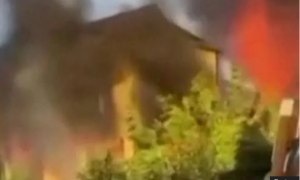Attacks on police officers, two churches and a synagogue in Russia’s North Caucasus republic of Dagestan have left many people dead.
Gunmen targeted the cities of Derbent and Makhachkala on the Orthodox festival of Pentecost.
The dead include at least six police officers, a priest and a security guard. Four of the attackers are dead and police are hunting for others.
The assailants have not been identified, but Dagestan has in the past been the scene of Islamist attacks.
The churches and synagogue were set ablaze in Sunday’s attacks. An Orthodox Church priest was killed in in Makhachkala, Dagestan’s largest city.
Footage posted on social media shows people wearing dark clothes shooting at police cars, before a convoy of emergency service vehicles arrive at the scene.
In Derbent – home to an ancient Jewish community – gunmen attacked a synagogue and a church, which were then set on fire.
An unofficial channel on the Telegram messaging app, Mash, said gunmen were barricaded in a building in Derbent.
A police vehicle was attacked in the village of Sergokal. Police detained Magomed Omarov, head of the Sergokalinsky district near Makhachkala, following reports that two of his sons were among those who carried out Sunday’s attacks.
Dagestan, one of the poorest parts of Russia, is a predominantly Muslim republic.
Between 2007 and 2017, a jihadist organisation called the Caucasus Emirate, and later the Islamic Emirate of the Caucasus, staged attacks in Dagestan and the neighbouring Russian republics of Chechnya, Ingushetia and Kabardino-Balkaria.
Following the attack on the Crocus City Hall venue near Moscow in March, authorities pointed the finger of blame at Ukraine and the West, even though the Islamic State group claimed it.
Back then President Vladimir Putin had insisted that “Russia cannot be the target of terrorist attacks by Islamic fundamentalists” because it “demonstrates a unique example of interfaith harmony and inter-religious and inter-ethnic unity”.
And yet three months ago Russia’s domestic security service, the FSB, reported that it had thwarted an IS plot to attack a Moscow synagogue.
Since Russia’s full-scale invasion of Ukraine, Russians have been led to believe that their principal adversaries are Ukraine and the “collective West”. That’s a message Russian authorities are reluctant to change, to avoid sparking public doubts about the official narrative
BBC

